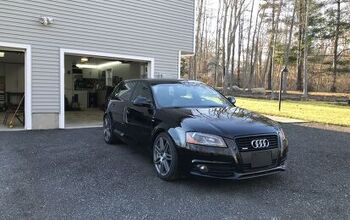Germany Demands Investigation Into Odd Exit of Volkswagen's Compliance Chief

Politicians from Volkswagen’s home region of Lower Saxony are raising questions over the unanticipated departure of the German automaker’s compliance chief, Christine Hohmann-Dennhardt, saying they have concerns over how the supervisory board handled the matter. There has been a long-standing apprehension among investors and business analysts that VW is too tightly controlled by its founding Porsche-Piech family and incapable of amelioration.
On Wednesday, Deutsche lawmakers called for a formal inquiry on the matter.
Hohmann-Dennhardt was brought aboard very late in 2015 to assist in Volkswagen’s reformation following the diesel emissions cheating scandal. However last month, after only a year on the job, she left abruptly with a sizable pension and gargantuan severance.
“[We are afraid] the state [government] and the supervisory board are only insufficiently carrying out their ownership role and controlling task,” local politician Mathias Middelberg wrote in a letter to Stephan Weil, Lower Saxony’s prime minister, obtained by Germany’s Spiegel Online.
Middelberg, who leads a commission of 31 delegates from Chancellor Angela Merkel’s Christian Democratic Union in Germany’s lower house of parliament, expresses concerns over reports that Hohmann-Dennhardt’s position as compliance chief was doomed from the beginning.
Further worry was expressed over the appointment of Manfred Doess as head of Volkswagen’s legal affairs. Doess is also compliance chief at Porsche Automobil Holding SE and well connected within the Porsche-Piech family. Middelberg suggested that Doess seems to have more sway within the company post-emissions scandal than Hohmann-Dennhardt did, even though he was supposed to be her subordinate.
The letter also formally requests that Weil, who also sits on VW’s supervisory board, bring in impartial and independent investigators to establish both the roles of Hohmann-Dennhardt and Doess, including how their authority was defined. Middelberg also wants an inquiry as to why the former compliance chief was issued a monthly pension of 8,000 euros with an additional 12 to 15 million euro [12.6 million to 15.8 dollar] severance package.

A staunch consumer advocate tracking industry trends and regulation. Before joining TTAC, Matt spent a decade working for marketing and research firms based in NYC. Clients included several of the world’s largest automakers, global tire brands, and aftermarket part suppliers. Dissatisfied with the corporate world and resentful of having to wear suits everyday, he pivoted to writing about cars. Since then, that man has become an ardent supporter of the right-to-repair movement, been interviewed on the auto industry by national radio broadcasts, driven more rental cars than anyone ever should, participated in amateur rallying events, and received the requisite minimum training as sanctioned by the SCCA. Handy with a wrench, Matt grew up surrounded by Detroit auto workers and managed to get a pizza delivery job before he was legally eligible. He later found himself driving box trucks through Manhattan, guaranteeing future sympathy for actual truckers. He continues to conduct research pertaining to the automotive sector as an independent contractor and has since moved back to his native Michigan, closer to where the cars are born. A contrarian, Matt claims to prefer understeer — stating that front and all-wheel drive vehicles cater best to his driving style.
More by Matt Posky
Latest Car Reviews
Read moreLatest Product Reviews
Read moreRecent Comments
- W Conrad I'm not afraid of them, but they aren't needed for everyone or everywhere. Long haul and highway driving sure, but in the city, nope.
- Jalop1991 In a manner similar to PHEV being the correct answer, I declare RPVs to be the correct answer here.We're doing it with certain aircraft; why not with cars on the ground, using hardware and tools like Telsa's "FSD" or GM's "SuperCruise" as the base?Take the local Uber driver out of the car, and put him in a professional centralized environment from where he drives me around. The system and the individual car can have awareness as well as gates, but he's responsible for the driving.Put the tech into my car, and let me buy it as needed. I need someone else to drive me home; hit the button and voila, I've hired a driver for the moment. I don't want to drive 11 hours to my vacation spot; hire the remote pilot for that. When I get there, I have my car and he's still at his normal location, piloting cars for other people.The system would allow for driver rest period, like what's required for truckers, so I might end up with multiple people driving me to the coast. I don't care. And they don't have to be physically with me, therefore they can be way cheaper.Charge taxi-type per-mile rates. For long drives, offer per-trip rates. Offer subscriptions, including miles/hours. Whatever.(And for grins, dress the remote pilots all as Johnnie.)Start this out with big rigs. Take the trucker away from the long haul driving, and let him be there for emergencies and the short haul parts of the trip.And in a manner similar to PHEVs being discredited, I fully expect to be razzed for this brilliant idea (not unlike how Alan Kay wasn't recognized until many many years later for his Dynabook vision).
- B-BodyBuick84 Not afraid of AV's as I highly doubt they will ever be %100 viable for our roads. Stop-and-go downtown city or rush hour highway traffic? I can see that, but otherwise there's simply too many variables. Bad weather conditions, faded road lines or markings, reflective surfaces with glare, etc. There's also the issue of cultural norms. About a decade ago there was actually an online test called 'The Morality Machine' one could do online where you were in control of an AV and choose what action to take when a crash was inevitable. I think something like 2.5 million people across the world participated? For example, do you hit and most likely kill the elderly couple strolling across the crosswalk or crash the vehicle into a cement barrier and almost certainly cause the death of the vehicle occupants? What if it's a parent and child? In N. America 98% of people choose to hit the elderly couple and save themselves while in Asia, the exact opposite happened where 98% choose to hit the parent and child. Why? Cultural differences. Asia puts a lot of emphasis on respecting their elderly while N. America has a culture of 'save/ protect the children'. Are these AV's going to respect that culture? Is a VW Jetta or Buick Envision AV going to have different programming depending on whether it's sold in Canada or Taiwan? how's that going to effect legislation and legal battles when a crash inevitibly does happen? These are the true barriers to mass AV adoption, and in the 10 years since that test came out, there has been zero answers or progress on this matter. So no, I'm not afraid of AV's simply because with the exception of a few specific situations, most avenues are going to prove to be a dead-end for automakers.
- Mike Bradley Autonomous cars were developed in Silicon Valley. For new products there, the standard business plan is to put a barely-functioning product on the market right away and wait for the early-adopter customers to find the flaws. That's exactly what's happened. Detroit's plan is pretty much the opposite, but Detroit isn't developing this product. That's why dealers, for instance, haven't been trained in the cars.
- Dartman https://apnews.com/article/artificial-intelligence-fighter-jets-air-force-6a1100c96a73ca9b7f41cbd6a2753fdaAutonomous/Ai is here now. The question is implementation and acceptance.


































Comments
Join the conversation
With every new development in the Gift that Keeps on Giving that is the TDI scandal, I become more and more convinced that VW mgmt. is operating in a "Rules are for Little People" mindset, and they seem to be inherently unable to understand that this scandal is going to cost them a lot of money, and going to cost a lot more, unless they actually, truly, come clean. I still remember at the Detroit Auto Show last year an exec, even after all that time, claiming that It Was All a Big Misunderstanding. (Even though by then it was perfectly clear that this was not something like ending up on the wrong side of some ambiguity; it was outright lawbreaking.)
i bought in at $27 so im not complaining too much. it was just money that was going to sit in a checking account and do nothing anyway.